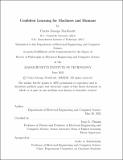Confident Learning for Machines and Humans
Author(s)
Northcutt, Curtis George
DownloadThesis PDF (12.92Mb)
Advisor
Chuang, Isaac L.
Terms of use
Metadata
Show full item recordAbstract
The coupling of machine intelligence and human intelligence has the potential to empower humans with augmented capabilities (e.g., improving rhyme-density while writing song lyrics, enhancing empathy via emotion detection, and personalizing learning in online courses). Unfortunately, humans operate in an uncertain world – where the performance of even the most sophisticated model-centric artificially intelligent system often depends on its data-centric ability to deal with the uncertainty in the labels upon which it is trained.
To this end, we introduce confident learning whereby a machine (like humans) must learn with noisy-labeled data, directly quantify and identify label noise, and unlearn misconceptions by re-learning with confidence on cleaned data with erroneous labels removed. We achieve this by developing a principled theory and framework for confident learning with affordances for quantifying, identifying, and learning with label errors in data, and we open-source their implementations in the cleanlab Python package. Based on human verification of the label errors found using cleanlab: we estimate a 3.4% lower bound error rate of the test set labels of ten of the most commonly used machine learning datasets across audio, image, and text modalities; examine the noise prevalence needed to change machine benchmark rankings; and provide corrected test sets so that humans can benchmark machine performance with increased confidence.
We then build and evaluate three artificially intelligent systems that augment human capabilities in noisy, real-world settings. Namely: (1) assisted-turn-taking in multi-person conversations by combining noisy embodied audio and video signals from multiple synchronized perspectives, (2) assisted-generation of writing song lyrics by exploiting the inherent aleatoric uncertainty of language and semantics, and (3) assisted-human-learning in open online courses by depolarizing/diversifying comment rankings to mitigate the majority bias inherent in rankings based on upvotes. In each case, the artificially intelligent system’s ability to overcome uncertainty is linked to its efficacy of augmenting human capabilities, and by extension, humans’ confidence in their ability to perform the associated task.
Date issued
2021-06Department
Massachusetts Institute of Technology. Department of Electrical Engineering and Computer SciencePublisher
Massachusetts Institute of Technology